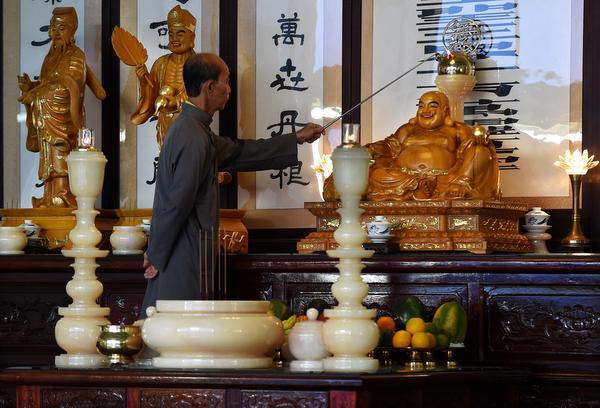The Huan De Temple in Uthandi, the first in India, promotes the philosophy of peace in everyday life
Just off East Coast Road in Uthandi lies a gleaming, modern structure bearing an unusual name —‘Huan De Temple’.
‘Huan De Temple’ literally translates into ‘The Temple of Universal Virtues’ and is a centre for the propagation of a philosophy called Tao.
Not to be confused with Taoism, Tao is a philosophy that propounds an upright way of life as a means of understanding the Universal Truth,” says Master Mak Siew Fong, a founder-trustee who lives in Malaysia, who is on a visit to the temple. Elders of the Tao order are referred to as Masters or Teachers.
The philosophy believes that we are all imbued with the basic values of benevolence, righteousness, propriety, wisdom and trustworthiness.
These are lost in the course of our daily lives; Tao seeks to bring about a transformation from within to help people connect with their true inner selves. While Tao is popular in China and South East Asia, it has its headquarters in New York, and centres in major cities of the world (there are more than 200 Tao temples worldwide). The Chennai temple is the first in India.
Chennai’s relationship with Tao goes back to the 6th Century CE, when Pallava king Simhavarman ruled Kanchipuram and its surrounding areas. His third son Bodhidharma is supposed to have been a meditative ascetic, who learnt Tao from a scholar. It is reported that he travelled to China, where he introduced Tao to the Chinese Emperor. This led to the proliferation of the philosophy throughout that country.
Master Fong explains that the doctrine of Tao comes from the teachings of Maitreya Buddha (or the ‘Laughing Buddha’ as we know him), who was a disciple of Gautama Buddha. “It is based on the premise that our needs are simple but our wants are endless, which leads to negativity in our lives. Tao teaches us that we are here to love one another and be kind. We hold the power to change our life by transforming our behaviour,” he elaborates.
The Chennai temple was established in April 2015, and holds three prayer services (mainly for world peace) every day. Master Madam Soong Moi Fong, another teacher, says the services are conducted in a serene, solemn atmosphere, where the “body, heart and thoughts have to be clean”.
The Temple does not actively solicit members or advertise ; most members were passers-by drawn to the temple while driving by.
The spacious three-storey temple has a central prayer hall, besides lecture halls, a dining room that can host 500 people, meeting rooms, a library, the administrative office and a couple of apartments for visiting teachers. Most of those who work at the temple are volunteers.
The temple funds some of its expenditure through the sale of fresh, home-made tofu that is made there every day.
As part of its outreach initiatives, the temple funds a host of charitable projects around ECR.
Volunteers were active during the floods in Chennai last December, taking part in relief efforts.
source: http://www.thehindu.com / The Hindu / Home> Features> Metroplus> Society / by Shazia Andaleeb / August 19th, 2016
